iOS Universal •
Since the release of Card Crawl a few years back, the Solitaire Card Game With A Cool Theme That Makes It Cooler Than Your Standard Card GameTM genre has really taken off. Tinytouchtales by themselves have released both Card Thief and Miracle Merchant, but there have been others as well, such as Guild of Dungeoneering and others that I can’t remember, not to mention that this opener is already getting a bit long in the tooth. Underhand is the latest game to arrive in the genre but, unfortunately, feels less like Card Crawl and more like the unholy love child of Choose-Your-Own-Adventure books and Groundhog Day.
Underhand begins with an interesting premise, placing you in the shoes of a cult leader in a Lovecraftian nightmare. Your goal is to awaken the Somewhat-great Old Ones from their slumber so they can do whatever it is that transdimensional demigods do. Wake up the god, and you win that hand.
Your celestial alarm clock comes in the form of a deck of cards that you’ll reveal one by one. Each card unfurls into a triptych, revealing three choices. If any of the options say “You Lose” and you’re forced to choose it, guess what? You lose. Otherwise, each choice will involve spending or receiving some of Underhand’s six resources. There are four “regular” resources; Money, Food, Cultists, and Prisoners. There’s one super-duper resource, Relics, and one icky resource, Suspicion.
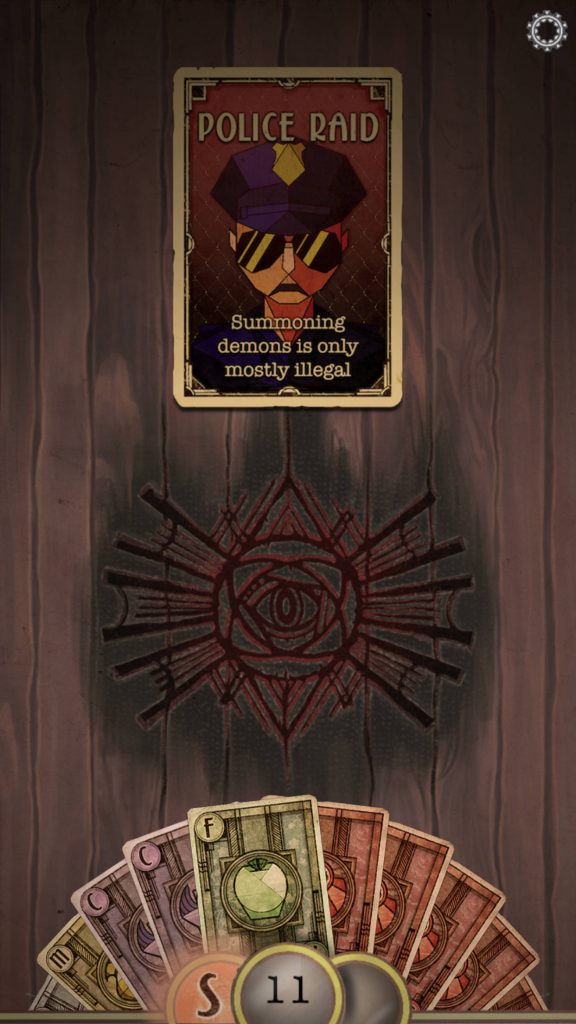
Let’s look at an example. A card might indicate that you’ve stumbled across some unsupervised children in the neighborhood. When you open the card, it reveals three choices: Take them Prisoner (which earns you Prisoner and Suspicion Resources), Indoctrinate them (which earns you Cultists and Suspicion), or leave them be (which nets you nothing). Other cards will require you to spend resources, such as sacrificing Cultists or Prisoners to your dark god. If you don’t have said resources in your hand, bad cards are added to the discard pile making your life miserable once the deck is reshuffled.
Occasionally cards with images of the Cthulhu-wannabees will pop up asking you to sacrifice something to add cards to your discard pile. These will, usually, progress the summoning forward so that when you draw the new card, you’ll have to sacrifice something else, adding another card, and so on until you do this enough to awaken the god, which usually (but not always) takes Relic resources to accomplish.
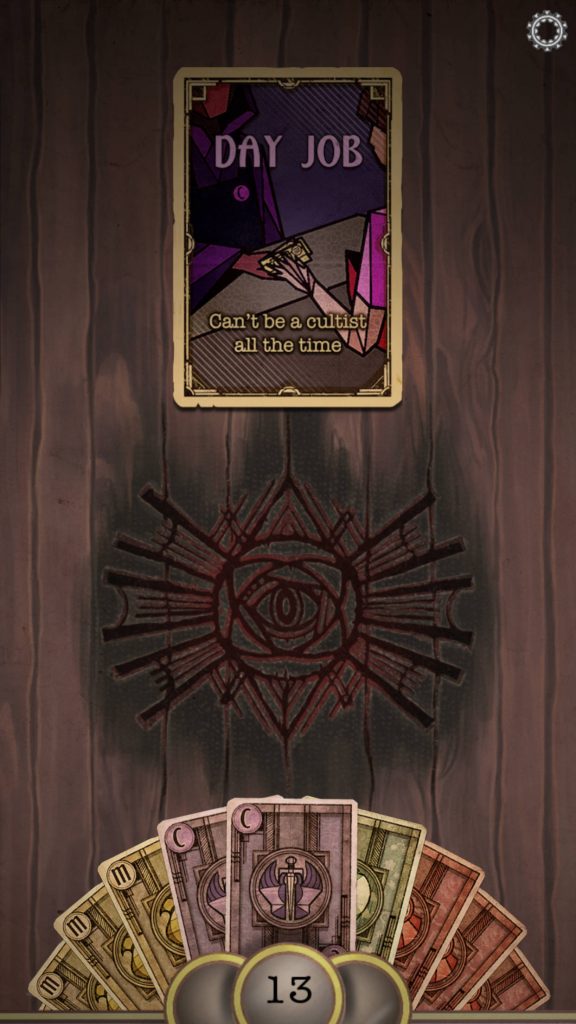
It all sounds really cool, doesn’t it? It kind of is, at least for a while. You’re restricted to holding only 15 resources in your hand, lest you summon the forces of Greed which will require a sacrifice of either 5 random resources (bad) or 2 Relics (very bad). The entire game involves managing the resources in your hand, ensuring that you have the proper capital to pay for your deck’s upcoming events. To succeed, you need to know what events are coming and what they’ll cost you. This is where the game’s cracks begin to show.
Each game consists of a deck of 10-15 cards, many of which seem random from game to game. Are they random? Can I influence which cards appear each game? I have no idea. Likewise, when you’re given the option to add new cards to the deck, you have no idea what that means. That’s okay if it’s your first time reading the Necronomicon, but not so much when trying to advance the game. For example, one of the god cards gives has the following options: Send a Large Party (requiring 2 Cultists and 2 Food) or Send a Small Party (requiring only 1 Cultist and Food). Both options state, “Insert the next Expedition event into the deck”, but it’s not clear why I would pick the more expensive option. How many Expedition events are there? What’s the ratio of good events to bad events? How will this choice influence that? None of that is apparent, and that’s not the only time this opacity hurts the overall gameplay.
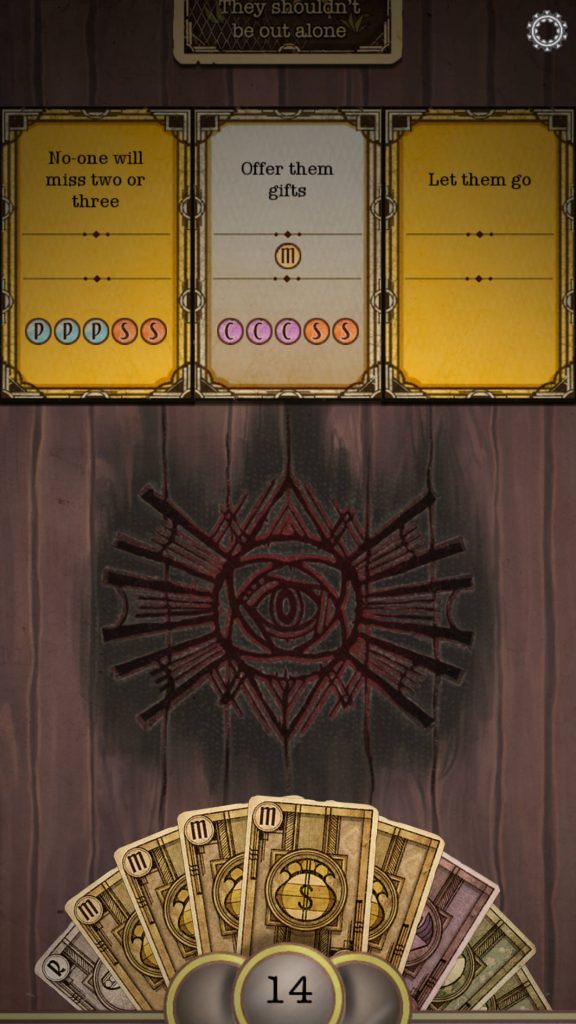
I can forgive the game for this, as uncovering the unknown fits with the theme (although, in my example above, you’re never quite sure if your choice mattered). What’s less forgivable is the absolute grind that the game evolves into. When you start a new game, your deck is set. It will not change, meaning you’ll be dealing with the same events over and over and over and over. The choices offered by each event are static and never change; helpful to learn which resources you’ll need to hoard for future reshuffles, but the 20th time through the deck seeing the Tax Man card feels less like a game mechanism and more like a torture method conceived by a Bond villain. This is compounded when you’re on one of the god paths and, seemingly randomly, are told that it failed and you have to start over. This requires many more reshuffles which means seeing all those same cards again and again just to get back to where you were, still unsure if you’ll succeed or be sent back to the starting line yet again due to a seemingly random card flip. (Is it random? Who knows, as the aforementioned opacity prevents you from knowing where these cards are being drawn from, and what that deck contains.) [You also just used the word “opacity” twice in one review. Achievement unlocked! -ed.]
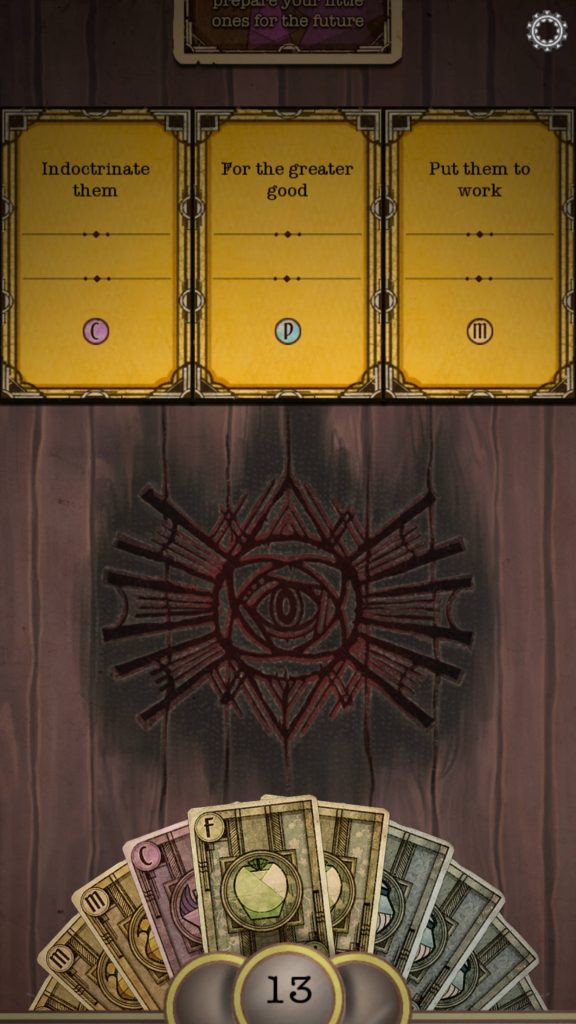
Underhand isn’t a terrible game. In fact, when I first started playing I was enchanted. The theme and presentation are top notch (although I recommend turning off the audio), and unlocking one of the early gods felt like finding an environmental puzzle in The Witness. The thrill eventually wears off, however, and the grind becomes a bit too grind-y.
Back at Pocket Tactics, Owen had a rule that reviews should never mention the app’s price. His view was that we’re not judging an app’s value, but if it’s inherently good or bad, price be damned. You may disagree with the philosophy, but we’ve tried to follow this rule here at Stately Play. That said, I’m about to break it. Underhand is free to download with no ads and no IAP. For that reason alone, I would recommend picking it up. Will you sink 20-30 hours into it? Hell no, but you’ll easily get 2-3 hours of fun and a glimpse of a nearly-great solitaire card game. Who knows, some updates and a few tweaks and maybe Underhand becomes the next Card Crawl. As it is right now, however, it’s merely a temporary, and free, distraction.

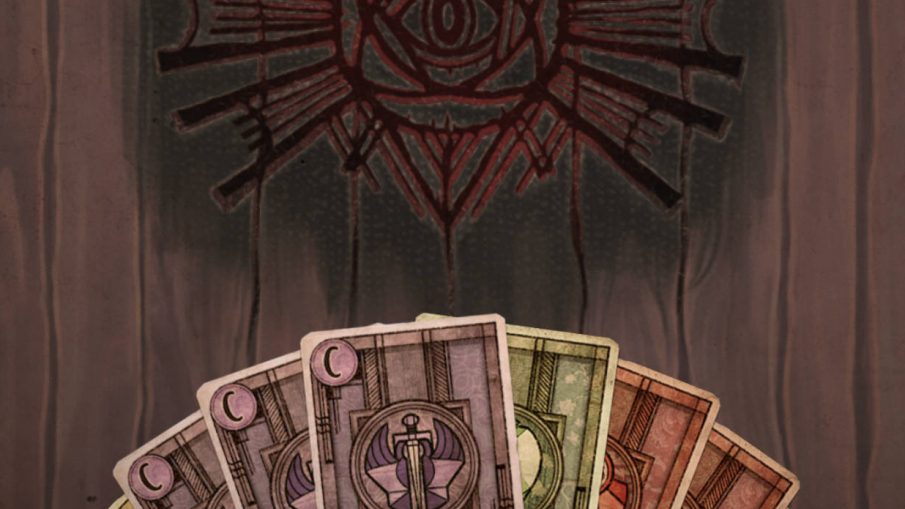

Start the discussion at discourse.statelyplay.com